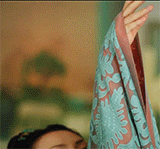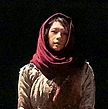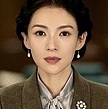Zhang Ziyi already an icon
We have come to expect feats of superhuman derring-do from the young Chinese actress Zhang Ziyi after films such as Crouching Tiger, Hidden Dragon and Hero. In her latest, House of Flying Daggers, directed by Zhang Yimou (who also directed Hero), she fends off armies of warriors while flying through treacherous bamboo forests as nonchalantly as most people might hop on a 73 bus. In person, thankfully, the 25-year-old is anything but ferocious, seeming, superficially at least, as delicate as a Ming vase — an impression reinforced when she has to ask me for help to unscrew the top of a small bottle of mineral water. “In your films, you are stronger,” I point out, leaning forward to take the bottle, secretly excited by this unexpected opportunity to show off my virility to one of the world’s most beautiful actresses. “Yes, in my films I can do everything I want,” she responds, her voice almost a whisper, glancing quickly at me and her translator to make sure she’s expressing herself properly in English. Unfortunately, going red in the face, I can’t open the bottle either, to her evident but discreet amusement.
Emasculated, I hand her another from the cabinet.
We’re meeting in Los Angeles because Zhang is here filming Memoirs of a Geisha, based on the bestselling and controversial novel by Arthur Golden. She had a part in the less than exalted comedy Rush Hour 2, but this is her first lead role in a Hollywood movie. It’s a tremendous opportunity for her; and, she is aware, a watershed for Asian actors. It’s a huge, lavish production, produced by Steven Spielberg, who is said to have personally selected her to play the young girl who becomes a geisha legend in prewar Japan. The director is Rob Marshall, whose last film was Chicago. Zhang has been living in LA for three months and is grateful to be getting a two-week Christmas break, when she can go home to Beijing to see her family and friends. Grateful, because in China actors are not indulged as they are in Hollywood. “Here we have weekends off,” she says with surprise. “In China, we work seven days; we don’t have Christmas, we don’t have weekends. For House of Flying Daggers, I worked five months. I trained two months. And I lived with a real blind girl, studying her, to get a lot of the details.” Yes, Zhang plays “blind” in the film, to add to the demands of her role. It’s an astonishingly complex performance, requiring physical and emotional skills beyond the range of most western actresses. Talk has started of a possible Oscar nomination.
With Memoirs of a Geisha, House of Flying Daggers and 2046, the sumptuous new film from Wong Kar-Wai, Zhang will become the standard-bearer of a new generation of Chinese actors, an icon of the new China. Despite obvious and, until recently, apparently unbridgeable cultural and language differences, these actors, who include Maggie Cheung, Chow Yun-Fat, Jet Li, Tony Leung and Andy Lau, are beginning to be able to work with equal facility both east and west. Their success — Zhang’s, in particular — is comparable to the way European stars such as Greta Garbo, Marlene Dietrich, Ingrid Bergman and Sophia Loren were co-opted by Hollywood from the 1930s onwards to provide American audiences with a celluloid vision of the sexually exotic.
For Zhang, it is a trail specifically blazed by Gong Li, whose seven extraordinary films with Zhang Yimou, including Red Sorghum and Raise the Red Lantern, established her as the most famous Chinese actress of the 1990s. But the older actress, who also appears in Memoirs of a Geisha and 2046, never quite made the jump into the Hollywood mainstream. That Zhang has been able to is in large part because the martial-arts films in which she made her name have had an appeal way beyond the art-house ghetto to which previous Chinese films were consigned. Crouching Tiger took an astonishing $128m in the US, while Hero was also an unexpectedly big hit, taking $53m. But fame has proved invidious to Zhang Ziyi. Many Chinese are distrustful of her success in the West and suspicious that she is playing a Japanese geisha in a big Hollywood film. They resent her for having supplanted Gong as the most famous Chinese actress, as Zhang Yimou’s muse and — rumours swirl, particularly in the overheated Hong Kong press — in his bed. She is often derogatorily called “little Gong Li”. Both she and Zhang Yimou, who is now 52, have refused to dignify these rumours with a comment. She still lives with her parents in Beijing, and claims she is too busy to have a boyfriend. Yet this apparent stonewalling has exasperated the Hong Kong press, which portrays her as imperious and arrogant. Zhang, meanwhile, has no qualms about expressing her hostility to them.
“Why do I have to tell them?” she asks, her voice just as soft, but her eyes showing her inner steel. “My life is my life. Things I feel like sharing, I will share, but the rest I can keep personal. If they ask personal questions and I keep a cold front, and don’t tell them anything, the next day they will say, ‘She is so arrogant’, or ‘bitchy’, or whatever. Then maybe I think, next time I will try to be nice. So, the next time I am friendly, and they say, ‘She had this silly smile.’ You just can’t win. Either way, they are going to make up their stories. Another thing is that, in Hong Kong, they are very snobbish. Hong Kong people often have this derogatory view of mainlanders: ‘How can you be an international movie star? You are only from China.’ For them, China is like the countryside.”
There is clearly an intense eroticism in Zhang Yimou’s use of her in his films, but we, the audience, are its real beneficiaries. The director first set eyes on her when she was 17 and he was casting a shampoo commercial. Although her hair was too short, he remembered her — “I was struck by what a pure, fresh, delicate face she had” — and a year later cast her in The Road Home, about a young woman in rural China in the 1950s, who falls in love with a new schoolteacher. Although Zhang had trained at the Beijing College of Dance from the age of 11, then at the Central Academy of Drama, Zhang Yimou says that she needed a lot of coaching at first. “But in a short time, she transformed herself into someone who can play very complex characters.” Her chief characteristic, he says, is that she is a perfectionist; his too, by all accounts. She claims she gleans what she can from other actors, recently Gong. “She is like my big sister. We talk a lot. She is very nice. Also, she is one of my favourite actresses; she is gorgeous. I spend time watching her on the set.”
Zhang acknowledges, however, that it was Ang Lee’s Crouching Tiger that really transformed her into an actress. She says she found it difficult to play a character much tougher than she is, and that she cried herself to sleep most nights on the intensely rigorous shoot. Although Crouching Tiger, Hero and House of Flying Daggers are all set within the strict confines of the wuxia — swordplay and chivalry — martial-arts tradition, they called for quite different skills from her. In fact, House of Flying Daggers is a calculated and controversial attempt by Zhang Yimou to subvert the genre. The tradition in such films, which for many years mirrored the social imperatives in communist society, is that the characters must sacrifice love for social ideals. “It used to be that a heroine has to give up her love for the collective wellbeing,” he says. “House of Flying Daggers is much more like a modern romantic story, in which the characters sacrifice every other thing for love.” The action is set in AD859, towards the end of the Tang dynasty, when a band of revolutionaries known as the House of Flying Daggers is fighting against the corrupt government. Leo and Jin, two government captains, are ordered to capture the band’s new leader by gaining the trust of Mei (Zhang Ziyi), a beautiful blind dancer at a brothel, who they think is the daughter of the old leader. Jin escorts Mei to the secret headquarters of the House of Flying Daggers. On the dangerous trip, the two, against their better judgment and with potentially devastating consequences, fall in love. The film is also an absolutely breathtaking visual feast, surpassing anything that has been achieved with wuxia films.
It has become the second-highest-grossing Chinese film on the mainland, after Hero, and has scandalised many, but clearly thrilled many others, because of its intense depiction of passion and sexuality. As Zhang Yimou points out, its revolutionary — post-communist — message, that individual love and desire should have primacy over the collective imperative, resonates perfectly with the tens of millions of young people who live essentially western lives in China’s booming cities, making money, and love, without the strict social and moral prohibitions of the communist era. “Young people have become much more interested in themselves and their own values,” he believes. For them, there is nothing shocking about depicting Mei as sexually desiring. One scene, for instance, shows her bathing naked in a lake, knowing Jin is watching her. “Mei is modern and unconventional,” says the director; and the actress who plays her “is liberated too”. In 2046, Zhang also plays a sexually aggressive, liberated character, a dance-hall hostess and prostitute.
Although her face has also become a staple of Asian advertising campaigns, selling everything from Coca-Cola to Maybelline, she fends off suggestions she has become a sex symbol. “People in the audience have a strong attraction to my characters,” she says. “I think a lot of that is the gift from the characters, the gift from the screenplay. I am thankful for that.” But it is something more than that. Like many of the greatest actresses, she has found a way to let us invest all our emotions and desires in her face. As Ang Lee said of her: “She allows the audience to pour themselves into her imagination. It’s not really her in the movie, it’s you. That’s beyond acting; it’s cinematic charisma.”
 Welcome to Zhang Ziyi Infos, your best source for the Chinese actress since 2007. Zhang Ziyi is a famous actress known for her roles in Crouching Tiger, Hidden Dragon, Memoirs of a Geisha, The Grandmaster and so many other great films. Zhang Ziyi recently directed the short film Poem in the anthology film My Country, My Parents. Read her full biography
Welcome to Zhang Ziyi Infos, your best source for the Chinese actress since 2007. Zhang Ziyi is a famous actress known for her roles in Crouching Tiger, Hidden Dragon, Memoirs of a Geisha, The Grandmaster and so many other great films. Zhang Ziyi recently directed the short film Poem in the anthology film My Country, My Parents. Read her full biography 






















